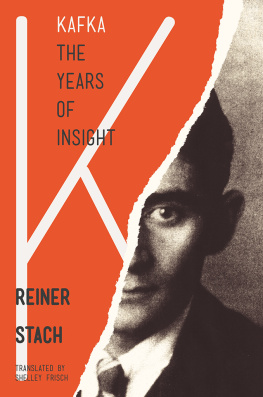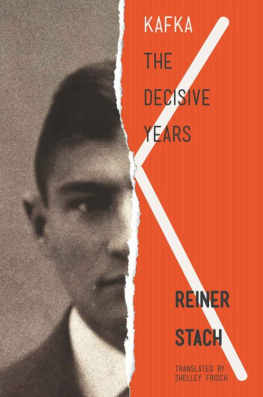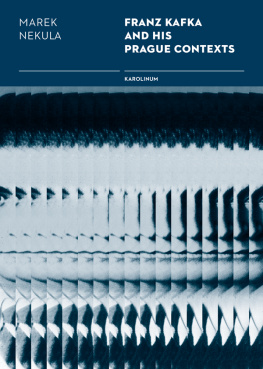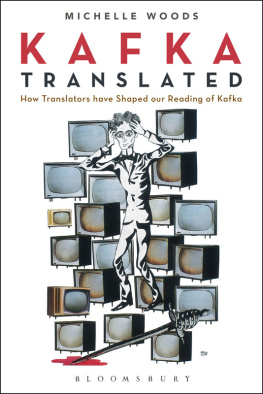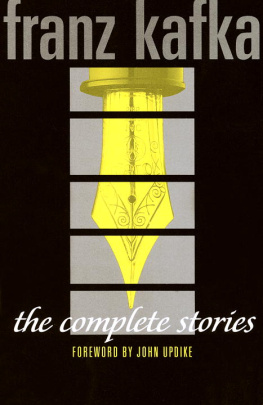KAFKA
THE
EARLY
YEARS
REINER
STACH
TRANSLATED BY SHELLEY FRISCH
PRINCETON UNIVERSITY PRESS
Princeton and Oxford
Originally published in Germany as KafkaDie frhen Jahre
S. Fischer Verlag GmbH, Frankfurt am Main 2013
Translation copyright 2017 by Princeton University Press
Published by Princeton University Press, 41 William Street, Princeton, New Jersey 08540
In the United Kingdom: Princeton University Press, 6 Oxford Street, Woodstock, Oxfordshire OX20 1TR
press.princeton.edu
Jacket photograph courtesy of Deutsches Literaturarchiv Marbach
Excerpt from Going Under reprinted by permission of Gerald Casale
Excerpt from Pieces and Parts reprinted by permission of Laurie Anderson
The Sound of the Crowd
Words and Music by Phil Oakey and Ian Burden
1981 BMG Dingsong Limited
All Rights Administered by BMG Rights Management (US) LLC
All Rights Reserved Used by Permission
Reprinted by Permission of Hal Leonard LLC
All Rights Reserved
Library of Congress Cataloging-in-Publication Data
Names: Stach, Reiner, author. | Frisch, Shelley Laura, translator.
Title: Kafka, the early years / Reiner Stach ; translated by Shelley Frisch.
Other titles: Kafka, die frhen Jahre. English
Description: Princeton : Princeton University Press, 2016. | Includes bibliographical references and index.
Identifiers: LCCN 2016021490 | ISBN 9780691151984 (hardback)
Subjects: LCSH: Kafka, Franz, 1883-1924Childhood and youth. | Authors, Austrian20th centuryBiography. | BISAC: BIOGRAPHY & AUTOBIOGRAPHY / Literary. | LITERARY CRITICISM / European / Eastern (see also Russian & Former Soviet Union). | LITERARY CRITICISM / General.
Classification: LCC PT2621.A26 Z88413 2016 | DDC 833/.912dc23 LC record available at https://lccn.loc.gov/2016021490
British Library Cataloging-in-Publication Data is available
The translation of this work was funded by Geisteswissenschaften InternationalTranslation Funding for Humanities and Social Sciences from Germany, a joint initiative of the Fritz Thyssen Foundation, the German Federal Foreign Office, the collecting society VG WORT and the Brsenverein des Deutschen Buchhandels (German Publishers & Booksellers Association)
This book has been composed in Verdigris MVB Pro text with Mensch display
Printed on acid-free paper.
Printed in the United States of America
10 9 8 7 6 5 4 3 2 1
CONTENTS
TRANSLATORS PREFACE
It took Reiner Stach two decades of intense, wide-ranging research and writing to produce this monumental three-volume biography of Franz Kafka. Readers in German-speaking countries were rewarded for their patience when this, the final volume, Kafka: Die frhen Jahre , was published by S. Fischer Verlag in 2014, as a capstone to a trilogy that first saw publication with Kafka: Die Jahre der Entscheidungen (2002) and then Kafka: Die Jahre der Erkenntnis (2008). The 2002 tome appeared in English as Kafka: The Decisive Years in 2005 and was followed by the translation of the 2008 work as Kafka: The Years of Insight in 2013. And now, with the publication of Kafka: The Early Years , English-language readers have access to the full story of Kafkas life, a project driven by the authors intention to invite readers to experience what it was like to be Kafka.
As the titles reveal, the last volume to be written covers Kafkas early years, and the volume written first covers Kafkas middle years. This order of publication, which may appear counterintuitiveeven fittingly Kafkaesquewas dictated by years of high-profile legal wrangling for control of the Max Brod literary estate in Israel, during which access to the materials it contained, many of which bore directly on Kafkas formative years, was barred to scholars. The justice system there has now ruled against the family that had been claiming the right to keep these materials in private ownership and away from the public, a welcome ruling for researchers and the general reading public. Reiner Stach has been able to examine three volumes of Brods diaries in this collection, those from the years 1909 to 1911; these are referenced in the text simply as Max Brod, diary, followed by the date(s) in question. He has also been able to draw on a detailed (170-page) inventory of the literary estate as a whole. Reiner Stachs Kafka biography is the first to mine and incorporate these hitherto unknown materials as well as much other information that has never found its way into a biography of Kafka, such as the unpublished memoirs of Kafkas classmate Hugo Hecht. These materials shed new and revelatory light on Kafkas early years and more than justify Stachs decision to hold off on this final (that is, first) volume until he was able to assess and integrate them.
As a translator primarily of biographies, I have had ample opportunity to examine their building blocks from up close. Each biography I work on situates itself at a distinct point along the life-and-works spectrum, most often closer to the works end, focusing squarely on the achievements of an individual and chronicling a life as a means of clarifying how these achievements came about. A different situation applies here. In the case of Kafka, the works have been analyzed and reanalyzed at bookshelf-filling length, yet there has been a surprising paucity of biographical studies. Reiner Stachs three-volume biography, mammoth in length and scope, offers a panoramic view of Franz Kafkas life in its socioeconomic, political, religious, artistic, cultural, linguistic, pedagogical, bureaucratic, and even medical dimensions, in a wealth of compelling and poignant detail. Little wonder that critics on both sides of the Atlantic have hailed it as the definitive biography of Kafka.
In his exploration of what it was like to be Kafka , Stach brings the reader inside Kafkas life and expands on the myriad issues that touched his world: his school and university days; his childhood and adult friendships; his tortured relationships with his parents and with women; the illnesses that dogged him throughout his all-too-brief life; his professional development and daily routines on the job and at home; his voluminous correspondence; his encounters and engagement with emerging technologies, from cinema to airplanes; his evolving identity in regard to Judaism and his German-speaking Czech surroundings; his attraction to back-to-nature movements and odd dietary practices; his travels and yearnings to break away from Prague; his sexual maturation and attempts at marriage; and numerous other facets of his life, particularly his resolve to write, full-time if at all possible, while hesitating to share his writing with anyone, let alone seek publication.
Every detail in this biography is authentic, right down to the correctness of the weather descriptions on any given day. Achieving this authenticity was no easy task, particularly in the Early Years volume, for which the documentary evidence is so much sparser. Readers of this biography will find myths about Kafka exploded, especially the myth of Kafkas otherworldly nature and alienation from everyday life. His job as a civil servant brought him into daily contact with the stark realities of the Great War, and with the quotidian travails that came with the profession of an insurance institute clerk whose job duties included drafting (brilliantly argued) legal briefs on an array of bureaucratic, technological, and health and safety issues. We also find ample evidence of the startling extent to which his literary and legal writings are intertwined.
While I generally dont look back at my completed translations once they are out in the world for others to read, I find myself turning to this biography again and again, savoring and perpetually surprised by its sharp storytelling, by turns humorous and poignant. I conjure up images of Kafkas appearance in swimming trunks at a Christian fundamentalist nudist colony; his dismay at the sight of Felice Bauers tainted teeth; his mad dashes up the stairs to the top floor of the insurance institute when running late; his fascination with lowbrow entertainment; his habit of Fletcherizing his yogurt and nuts; his three engagements and dis engagements; his short-lived plan, with his friend Brod, to publish a series of travel guides on the cheap; his reluctance to part with his texts for publication. And who can forget what Ive come to think of as the misery of mirth chapter, when Kafka is offered a promotion at the insurance institute, and instead of offering the requisite solemn words of gratitude, he collapses in loud and reckless laughter? This biography reads like a novel, frames its observations with the visual acuity of cinema, and sheds startling new light on the impulse behind Kafkas storytelling. When I now return to Kafkas literary texts, including and most especially his fragments, such as the one about the man who sets a world record in swimming at the Olympics although he cannot swim , I see him facing his own vast sea of impossibilities.
Next page

